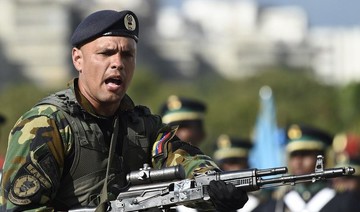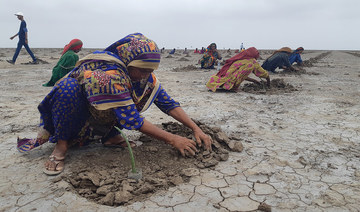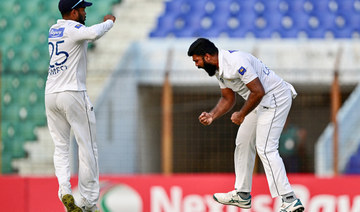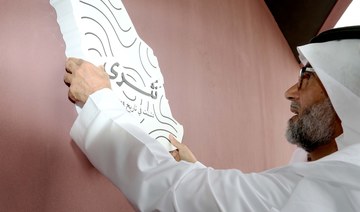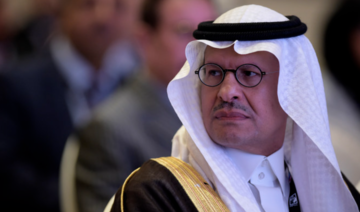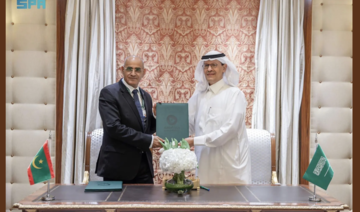PUNTO FIJO, Venezuela: Nieves Ribullen, a Venezuelan oil worker sick of struggling to get by as his country falls apart, is betting it all on far-away Kurdistan to give his family a better life.
Over the years he’s watched dozens of co-workers abandon poverty wages and dangerous working conditions at the rundown complex of refineries in Punto Fijo on Venezuela’s Caribbean coast for jobs in far-flung places like Kuwait, Angola and Chile.
Now it’s his turn. Leaving his wife and three children behind, he’ll soon ship out to Kurdistan, where he expects to earn more than $3,500 a month — a fortune compared to the less than $20 he brings home monthly in increasingly unstable Venezuela.
“I only earn enough to buy a kilo (2 pounds) of meat and one chicken each month,” Ribullen said. “We’re in chaos.”
Opposition leader Juan Guaido has rallied support from distraught Venezuelans and roughly 40 countries that now recognize him as Venezuela’s rightful president.
But the accelerating exodus of oil workers means that Venezuela’s crude production — already at a seven-decade low — is unlikely to rebound anytime soon, even if recently-imposed US sanctions are lifted and a business-friendly government replaces the increasingly wobbly President Nicolas Maduro.
Venezuela was once one of the world’s top five oil exporters, pumping 3.5 million barrels a day in 1998 when President Hugo Chavez was elected and launched Venezuela’s Bolivarian revolution. Today, the state-run oil company PDVSA produces less than a third of that. Critics blame corruption and years of mismanagement by the socialist government.
Even worse, production is about to sink even further due to fresh sanctions by the Trump administration targeting PDVSA and its Houston-based subsidiary Citgo with the aim of depriving Maduro of more than $11 billion in exports this year.
Despite the short-term pain they will bring Venezuela, Guaido said the sanctions are a critical part of stopping Maduro from consolidating power in what he calls a “dictatorship.”
Venezuela’s oil workers began flooding out in 2003, shortly after Chavez fired thousands of them — many by name on national television — for launching a strike that paralyzed output. The oil workers accused Chavez of riding roughshod over the nation’s democratic institutions, while Chavez said the picketers were plotting a coup.
Tomas Paez, a professor at Central University of Venezuela who studies the Venezuelan exile community, estimates that 30,000 oil workers fled in the initial wave, many banned from working in the country’s oil industry.
He said it’s difficult to gauge how many more have left as Venezuela’s economic problems have worsened under Maduro, but from the tar sands of northern Canada to the deserts of Kuwait, Venezuelan roughnecks now live in more than 90 oil-producing countries.
“Let’s say, where there is oil, there is a Venezuelan,” Paez said.
Many have made new lives in their adopted countries with no plans to return to a gutted Venezuela. And with each new departure, fewer remain behind with the know-how to pump the world’s most abundant oil reserves, once the economic backbone of a thriving country.
“We are losing man hours, hours of training, millions and millions of hours that we can’t calculate,” said union leader Ivan Freites, secretary of the Federation of Professionals and Technicians of Oil Workers of Venezuela. “It’s impossible to recover our trained personnel working abroad.”
In a recent speech laying out the economic plan for his second six-year term, Maduro vowed to catapult Venezuela’s production to 5 million barrels a day. But he provided few details other than promising to take charge personally and root out corruption.
The embattled president retains support from powerful allies, including Russia and China, which are both heavily invested in Venezuela’s oilfields. Maduro’s hand-picked head of the PDVSA, Maj. Gen. Manuel Quevedo, did not respond to requests for comment by The Associated Press.
While the most-talented engineers left long ago — many contributing to a production boom in neighboring Colombia — there’s still demand for labor throughout the industry.
“We’re still in a talent-short market, especially with people willing to go into hardship locations — like Kurdistan,” said Dane Groeneveld, CEO at California-based PTS Advance, an oil industry recruiter. “It’s those people who are now getting picked up by national oil companies around the world.”
The 43-year-old Ribullen said he was thinking of his family when made the decision to go to Kurdistan, leaving them behind until he’s saved enough to send them to Chile or the United States. His youngest, 9-year-old Isaak, cuddled up next to him on the couch of their living room.
“He doesn’t want me to go,” said Ribullen. “It’s difficult for us.”
He recalled starting work at PDVSA 16 years ago, when he made enough money to buy a Toyota and take his family to the Caribbean island of Aruba on vacation every year. Now, the car is long gone and it’s been seven years since the last family vacation.
Sometimes after his night shift he’s forced to stand in line for hours at the market to buy food for his family. He blames Chavez and Maduro for destroying his country.
Conditions are dangerous at the refinery, where Ribullen says workers clock in every day with memories of a massive explosion that killed dozens of workers in 2012. Workers don’t have company-issued hardhats, boots or gloves.
In Kurdistan, a semi-autonomous region within Iraq, he’ll join dozens of other Venezuelan roughnecks who live and work on a remote compound.
“The situation forces me to look for opportunities somewhere else,” he said. “We’re leaving this in God’s hands, asking that he’ll protect us.”
Oil workers flee Venezuela’s crisis for a better life
Oil workers flee Venezuela’s crisis for a better life
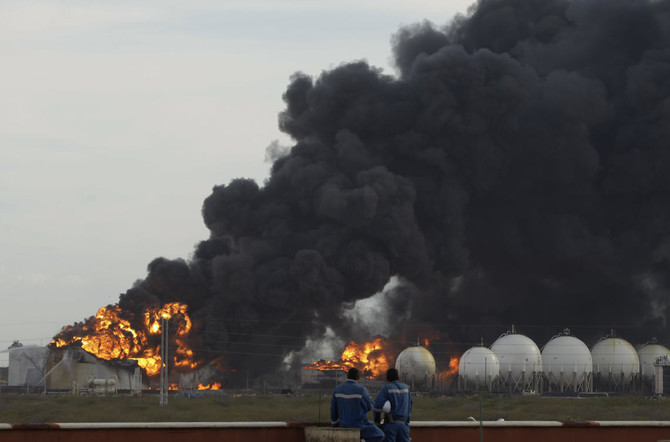
- Venezuela was once one of the world’s top five oil exporters, pumping 3.5 million barrels a day in 1998
- Venezuela’s oil workers began flooding out in 2003, shortly after previous president Hugo Chavez fired thousands of them
Sri Lanka joins Global South-North dialogue through Riyadh WEF meeting
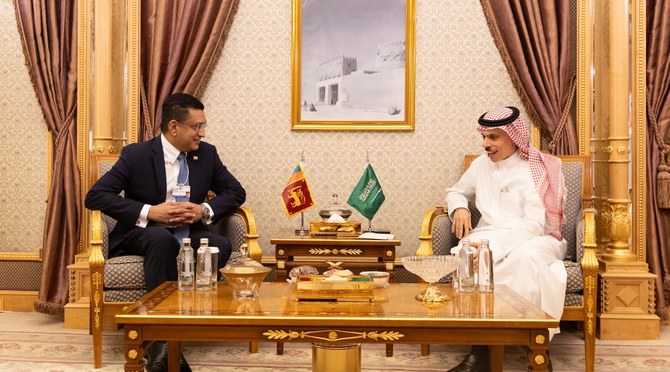
- Foreign Minister Ali Sabry was among the special meeting’s speakers
- He represented the Global South perspective at the invitation of Saudi FM
COLOMBO: Sri Lanka is trying to position itself in the dialogue between the Global South and North, its foreign minister said, following the World Economic Forum’s special meeting on global collaboration organized by Saudi Arabia.
The WEF’s Special Meeting on Global Collaboration, Growth and Energy for Development convened 1,000 global leaders arriving in Riyadh from 92 countries on April 28-29 to find actionable, collaborative and sustainable solutions to shared challenges.
The meeting saw a focus on the Global South, or countries, mostly in the Southern Hemisphere and largely in Africa, Asia and Latin America, which until recently have often been described as developing or less developed.
Sri Lanka FM Ali Sabry represented the Global South perspective at the forum’s session titled “North to South, East to West: Rebuilding Trust” alongside his Saudi counterpart, Prince Faisal bin Farhan.
“It was a great opportunity for me to showcase Sri Lanka and the challenges that countries in the Global South face, and also to position Sri Lanka as an important player, particularly in the Global South in shaping the future … for collaboration, peace and stability, rather than confrontation,” he told Arab News.
The minister was in Riyadh at the invitation of Prince Faisal, with whom he also held a meeting.
“We look forward to elevating the partnership,” Sabry said.
“We intend to sign the investment protection agreement that would probably pave the way for the inflow of investment into Sri Lanka.”
He also met other Saudi leaders during his visit to explore further cooperation possibilities.
The Kingdom has expanded ties with the South Asian island nation since last year, agreeing to broaden political consultation and launching a new employment scheme aimed at boosting Sri Lanka’s manpower exports.
Colombo has since sought Saudi assistance in developing several of its key sectors, including tourism and agriculture.
Saudi Hajj minister in Jakarta as Indonesia prepares record number of pilgrims
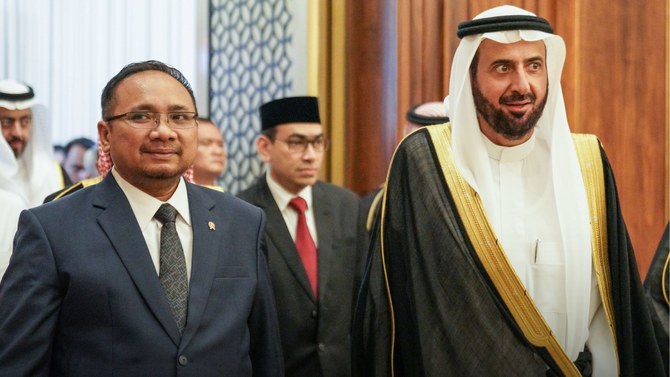
- 241,000 Indonesian pilgrims are set to perform the Hajj this year
- Saudi minister will launch tourism exhibit in Jakarta on Wednesday
JAKARTA: Saudi Arabia’s Hajj and Umrah Minister Tawfiq Al-Rabiah held meetings in Jakarta on Tuesday to coordinate pilgrimage preparations as Indonesia is going to send its largest-ever Hajj contingent this year.
The Kingdom has approved the 2024 quota of 241,000 Indonesian pilgrims, an increase of 20,000 from last year.
Al-Rabiah held discussions with Indonesia’s Religious Affairs Minister Yaqut Cholil Qoumas on ways to streamline Hajj services for the Asian nation’s pilgrims.
“I just had a long and productive meeting and discussion with my brother, the Indonesian religious affairs minister, which was focused on giving the best services and ease for Hajj and Umrah pilgrims from Indonesia,” Al-Rabiah said during a press conference.
“The Saudi government has revitalized historical and Islamic sites in Makkah and Madinah, and other sites related to pilgrimage and the journey of Prophet Muhammad … and we invite all pilgrims to come and visit these sites.”
Indonesia’s higher quota will help shorten the wait for some pilgrims by a few years, which is especially important for the elderly in the Southeast Asian nation. Many in the country wait up to 45 years for their turn, according to official estimates.
Qoumas said his interactions with Al-Rabiah had been meaningful.
“Maybe we can consider Indonesia as having received a special treatment from the Saudi government, as we are welcoming a big delegation led directly by the Saudi Hajj and Umrah minister, who are here to ensure that Indonesian Hajj pilgrims this year will get the best services from the Kingdom of Saudi Arabia,” Qoumas said.
“As a representative of the Indonesian government, we feel very grateful and thankful.”
Al-Rabiah is scheduled to inaugurate on Wednesday a Saudi Tourism Authority event showcasing the variety of travel destinations the Kingdom has to offer as it aims to attract more international visitors under Vision 2030.
Germany failing to protect Muslims from hate: Human Rights Watch
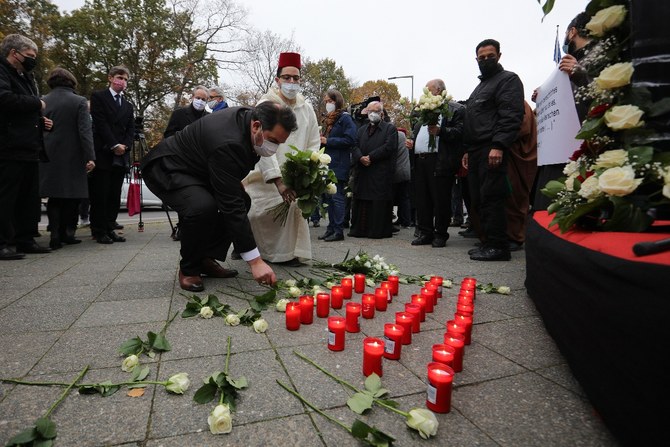
- Government ‘lacks understanding’ of racism targeting Muslim communities
- 2023 marked ‘frighteningly new high’ for hate incidents: German NGO chief
LONDON:Germany is failing to protect Muslims from growing racism amid a “lack of understanding” about the issue, Human Rights Watch has warned.
The country has yet to implement a working definition of anti-Muslim racism and frequently fails to record data on race-hate incidents, the organization said on Tuesday.
A key failing of the German government concerns its “lack of understanding that Muslims experience racism and not simply faith-based hostility,” said Almaz Teffera, a HRW researcher on racism in Europe.
“Without a clear understanding of anti-Muslim hate and discrimination in Germany, and strong data on incidents and community outreach, a response by the German authorities will be ineffective.”
Germany recorded 610 “anti-Islamic” crimes in 2022, but from the start of 2023 to September that year, the number had climbed to 686.
There are fears that the figure has further surged since the outbreak of the Gaza conflict last October.
Germany’s Interior Ministry told HRW that it could not provide data on anti-Muslim crimes from October 2023 to the year-end.
However, civil society groups in the country recorded a spike in reported incidents, leading Germany’s federal commissioner for anti-racism, Reem Alabali-Radovan, to join an EU-wide expression of concern about the rise in hate.
The Alliance Against Islamophobia and Anti-Muslim Hate, a German NGO network, documented “an average of three anti-Muslim incidents a day” last November.
The network’s chief, Rima Hanano, told HRW that “2023 marked a frighteningly new high for anti-Muslim incidents.”
Though the network collects its own internal data on the frequency of hate incidents, the German government “has yet to develop an infrastructure for countrywide monitoring and data collection,” HRW said.
The government has also classified hate incidents against Muslims as “anti-Islamic” since 2017, removing nuances surrounding the ethnic identities of victims, HRW added.
A three-year study commissioned by the government and published last year recommended that authorities “no longer dissociate anti-Muslim hate from racism,” but instead “recognize their connection.”
However, the Interior Ministry has failed to carry out the report’s recommendations, HRW said, adding: “Any focus on anti-Muslim hate and discrimination that fails to include racism or acknowledge the intersectional nature of such hostility will be unable to capture the full picture or inform effective policy responses.”
Muslim communities in Germany are a “group with a diversity of ethnicities” rather than a “monolithic religious group,” said Teffera.
“Germany should invest in protecting Muslims and all other minority communities in Germany because it is an investment in protecting all of German society.”
A gunman kills 6 worshippers inside a Shiite mosque in western Afghanistan, the Taliban say
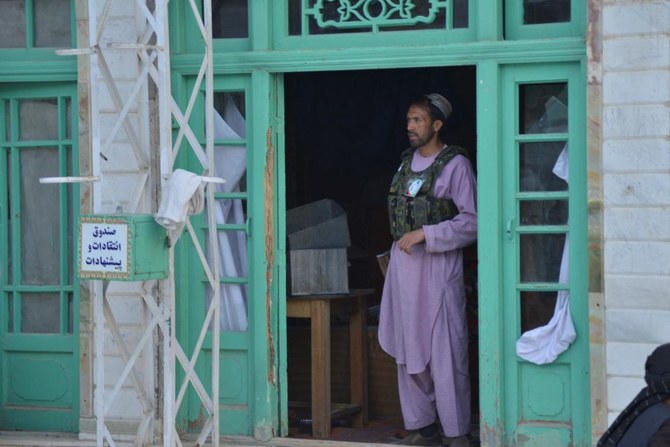
ISLAMABAD: A gunman stormed a mosque in western Afghanistan, opening fire and killing six people as they were praying, a Taliban official said Tuesday.
Local media reports and a former president of Afghanistan said the mosque was targeted because it was a place of worship for the country’s Shiite Muslim minority.
The attack happened on Monday night in the district of Guzara in Herat province, said Abdul Mateen Qani, a spokesman for the Taliban Interior Ministry. He said in a post on the social media platform X that an investigation was underway.
No one immediately claimed responsibility for the attack, which also wounded another worshipper while the attacker fled. Local media reported that the mosque's imam was among those killed.
“I strongly condemn the attack on the Imam Zaman Mosque,” former Afghan President Hamid Karzai said on X. “I consider this terrorist act against all religious and human standards.”
The United Nation Assistance Mission in Afghanistan also condemned the attack, which it said killed and wounded at least seven people, including a child. It called for urgent accountability for perpetrators and protection measures for Shitte communities.
The Islamic State group’s affiliate in Afghanistan is a major Taliban rival and frequently targets schools, hospitals, mosques and Shiite areas throughout the country.
The Taliban seized power in Afghanistan in August 2021, during the last weeks of the chaotic departure of U.S. and NATO troops from the country after 20 years of war.
Despite initial promises of a more moderate stance, the Taliban gradually reimposed a harsh interpretation of Islamic law, or Shariah, as they did during their previous rule of Afghanistan from 1996 to 2001.
Russia says United States is being hypocritical over ICC and Israel
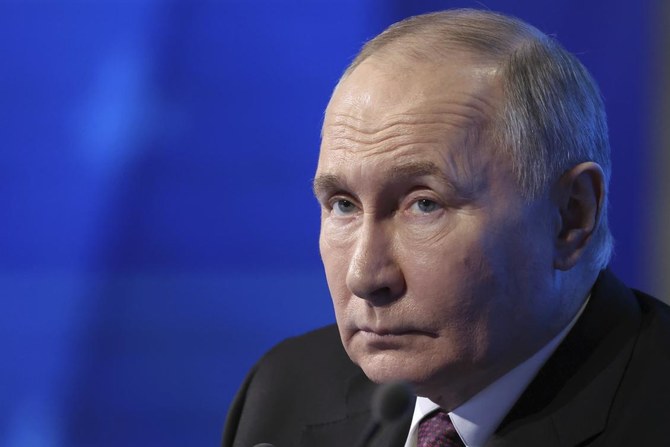
- US President Joe Biden said last year that the ICC decision to issue an arrest warrant for Putin was justified
MOSCOW: Russia said on Tuesday that the United States was being hypocritical by opposing the International Criminal Court’s (ICC) investigation of Israel but supporting the court’s warrant for the arrest of President Vladimir Putin.
The ICC — which can charge individuals with war crimes, crimes against humanity and genocide — is investigating Hamas’ Oct. 7 cross-border attack and Israel’s devastating military assault on Hamas-ruled Gaza, now in its seventh month.
White House spokesperson Karine Jean-Pierre said on Monday the United States did not support the ICC’s investigation of Israel and did not believe that the court had jurisdiction.
US President Joe Biden said last year that the ICC decision to issue an arrest warrant for Putin was justified. The United States has shared details of alleged Russian war crimes in Ukraine with the ICC.
Russia says the warrant against Putin is a meaningless attempt by the West to soil Russia’s reputation and denies war crimes in Ukraine. Ukraine says Russia committed war crimes. Russia says the West has ignored Ukraine’s crimes, a charge denied by Kyiv.
“Washington fully supported, if not stimulated, the issuance of ICC warrants against the Russian leadership,” Russian Foreign Ministry spokesperson Maria Zakharova said in a post on Telegram.
But “the American political system does not recognize the legitimacy of this structure in relation to itself and its satellites,” Zakharova said, adding that such a position was intellectually “absurd.”
The Kremlin has called the issuing of the warrant against Putin outrageous and legally void, as Russia is not a signatory to the treaty that created the ICC.
Israel is not a member of the ICC, while the Palestinian territories were admitted as a member state in 2015.
Prime Minister Benjamin Netanyahu said on Friday that any ICC decisions would not affect Israel’s actions but would set a dangerous precedent.
Israeli officials are worried that the court could issue arrest warrants against Netanyahu and other top officials for alleged violations of international humanitarian law in Gaza, Israeli media have reported.
They said the ICC is also considering arrest warrants for leaders from Hamas.



